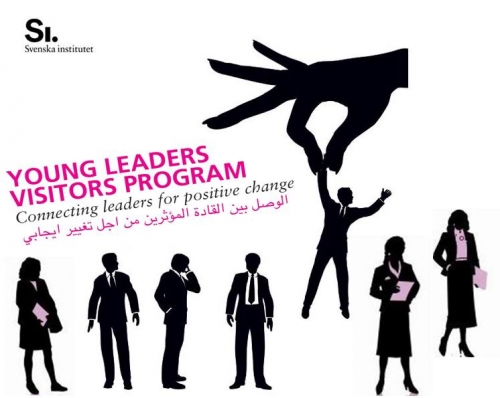Last May, I took part in a program called ‘the Young Leaders Visitors Program (YLVP) [1]‘, organized by the Swedish Institute [2] in Stockholm, Sweden. The program brought together young people from eight Arab countries and Sweden to learn certain leadership and organizational skills, and focused on how to use the tools of social media to advance social change. The participants will all meet again for a follow-up event in Paris, France, this November.

A few participants reflected on this experience, and shared some ideas on their blogs:
Jasmine Elnadeem [3] from Egypt, wrote:
It was just only by chance…. I applied for the Young Leaders Visiting Programme (YLVP) 2009, which was organized by the Swedish institute.
The Swedish Institute Young Leaders Visitors Program (YLVP) is an intercultural leadership program with focus on social media as a tool for positive change. The program invites young opinion-makers from Sweden and selected countries in the MENA region who are actively working for social change in their respective contexts.
People nowadays are starting to say that social media is going to change the world; nothing could be farther from the truth.
Yes, for most of us, social media has changed our lives in some meaningful way, but social media can’t change the world, people do through social media, it’s a tool.Nothing in this world is going to change unless we make it change. The responsibility for change does not fall onto technology but onto people. We can have all the greatest tools and gadgets in the world but if we don’t use them for change then guess what, change isn’t going to happen.
Let’s remember that social media and technology gives us the ability to make changes happen, but it’s ultimately up to us to use these abilities to make change happen.
Writing for Menassat [4], a regional news website based in Beirut, Lebanon, Alexandra Sandels from Sweden wrote:
The YLVP 2009 invited what the Swedish institute described as “young opinion-makers from Sweden and selected countries in the MENA region who are actively working for social change in their respective contexts.”
The program itself focused in large part on leadership and teamwork with a special component of training in social media tools. The first week was spent in Grisslehamn and the remaining two in Stockholm where participants attended lectures and worked on group projects at the digital media school Hyper Island.
In addition to the Arab participants, five Swedish journalists took part in the program.
“YLVP is designed to give you innovative tools to shape public opinion in cutting-edge media while strengthening your intercultural and leadership skills. You will be part of an exclusive network that will boost creativity and support your personal and professional development, while also laying the platform for a more connected future,” said the Swedish Institute in a statement describing the program.
At the beginning of the program, participants were divided into groups of 4-5 people and given the task to develop an idea for an innovative project using social media tools. A stream of initiatives was presented, ranging from web portals for alternative musicians in the Middle East to an online graffiti network, and a web-based recruitment agency for volunteers interested in working in human rights organizations in the Arab world.
And finally, Jordanian Rami AbdelRahman [5], who lives in Sweden, had this to say about the program:
To this extent, the Swedish institute arranged for an opinion building program, entitled “Young Leaders Visitors Program” targeting opinion builders in the MENA and Sweden, to work on their skills within social media, intercultural group work, leadership… etc. The course started in a very relaxed spa hotel in Grisslehamn, about an hours’ drive north of Stockholm, right on the Baltic sea.
The idea was simple: work our brains out trying to find creative solutions in very stressful schedules. It turned out we were not creative enough: we were tasked with finding impossible things that could happen, we mentioned living underwater, living on mars, world peace, etc, and it turns out that 80% of our choices were predicted by our creativity lecturer.